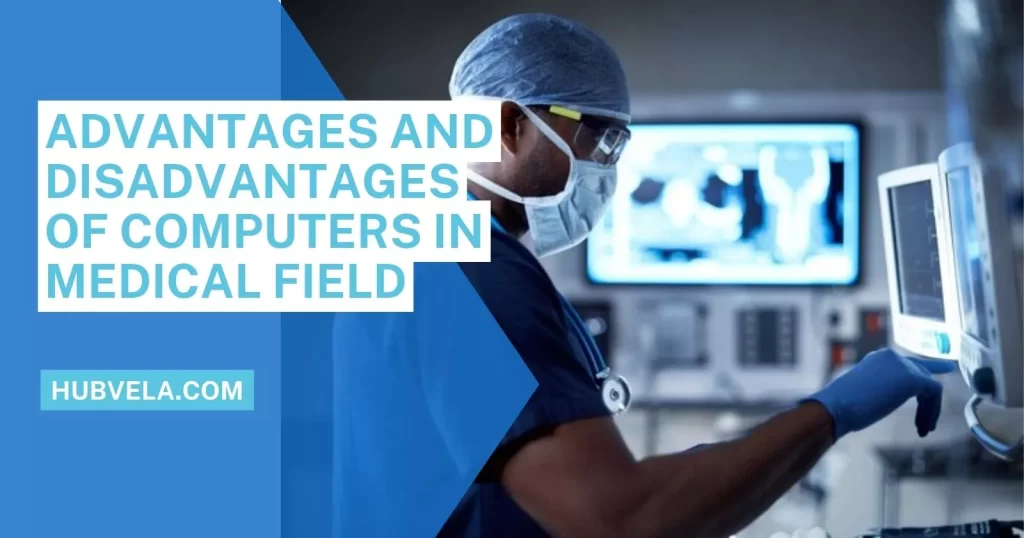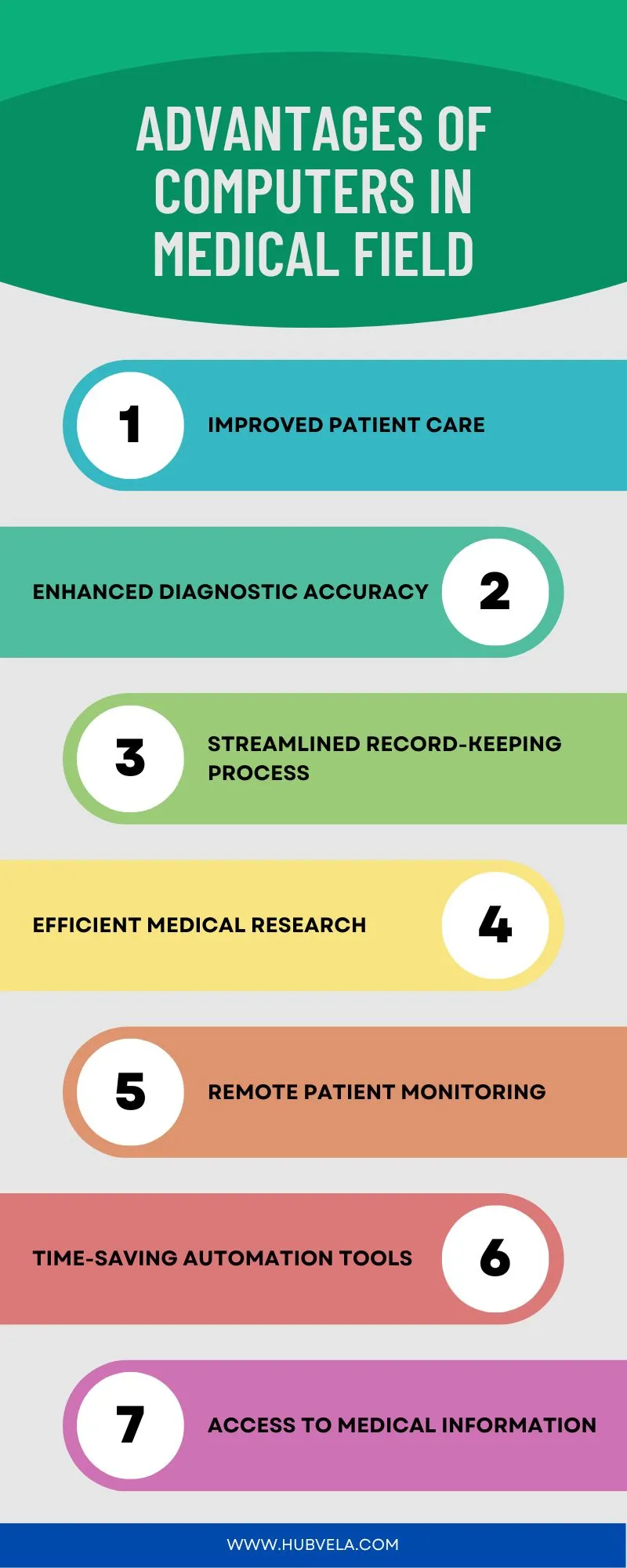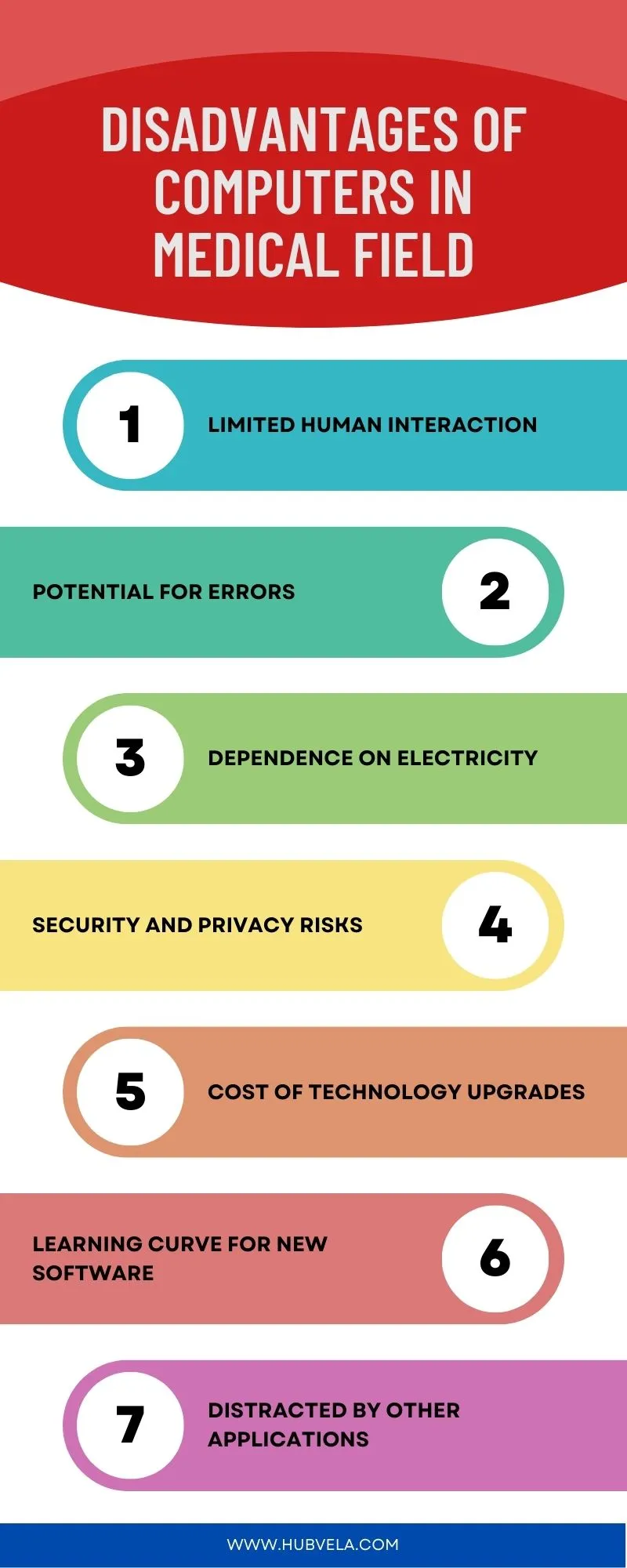Did you know that computers have revolutionized the medical field? They have brought numerous advantages and disadvantages to the table.
From improved patient care to efficient medical research, computers have played a crucial role in advancing medical practices.
However, there are also downsides, such as the cost of technology upgrades and the learning curve for new software. Additionally, the presence of other applications can sometimes distract healthcare professionals.
In this article, we will explore the advantages and disadvantages of computers in medical field, giving you a comprehensive understanding of how technology impacts healthcare.
Let’s dive in and discover the pros and cons of this digital transformation in medicine.

--Advertisement--
Advantages of Computers in Medical Field
The advent of computers in the medical field has revolutionized healthcare, offering numerous advantages that have improved patient care and streamlined daily operations. Some of the key benefits of computers in medicine include:

1. Improved Patient Care
One advantage of using computers in the medical field is that they allow you to quickly access and update patient records. This improved efficiency means that healthcare providers can easily retrieve important information, such as medical history and medications, leading to personalized treatment plans.
Computers also facilitate better communication between healthcare professionals and patients, enabling faster and more accurate information sharing.
Additionally, computers aid in data analysis, allowing for better diagnosis and treatment decisions.
Furthermore, remote consultations are made possible, expanding access to healthcare services.
2. Enhanced Diagnostic Accuracy
Computers in the medical field enhance diagnostic accuracy by providing healthcare professionals with advanced tools and technologies. Improved accuracy is achieved through the use of diagnostic technology, AI assistance, precision medicine, and computer-aided diagnosis.
These tools analyze vast amounts of patient data, identify patterns, and assist in making accurate diagnoses. By leveraging the power of computers, healthcare professionals can make more precise and informed decisions, leading to improved patient outcomes.
3. Streamlined Record-Keeping Process
To streamline the record-keeping process, you can utilize computers in the medical field, which allows healthcare professionals to efficiently store and access patient information.
This improved efficiency is made possible through electronic health records, which eliminate the need for manual filing and searching.
With the help of computers, data analysis becomes easier, enabling healthcare providers to spot trends and make informed decisions.
Additionally, streamlined record-keeping reduces paperwork, leading to increased patient satisfaction.
4. Efficient Medical Research
By utilizing computers in the medical field, you can greatly benefit from the efficient medical research capabilities they offer. Computers enable efficient data analysis, leading to improved healthcare outcomes. Technological advancements have revolutionized the research process, allowing for faster and more accurate results.
However, data privacy concerns must be addressed to ensure patient confidentiality. Additionally, computers have had a significant impact on medical education, providing access to vast amounts of information and facilitating collaborative learning.
5. Remote Patient Monitoring
With remote patient monitoring, you can easily track and monitor your health using computers in the medical field. This technology allows healthcare professionals to remotely monitor patients’ vital signs, such as heart rate, blood pressure, and oxygen levels, using wearable devices.
The benefits of remote monitoring include improved patient engagement, timely interventions, and reduced hospital visits. However, it’s crucial to ensure data privacy and security to protect patients’ sensitive medical information in this digital age.
6. Time-Saving Automation Tools
One advantage of using computers in the medical field is that they offer time-saving automation tools, allowing healthcare professionals to streamline their tasks and improve efficiency.
Automation benefits in the medical field include better time management, improved efficiency, increased productivity, and reduced manual tasks.
With automation tools, repetitive and time-consuming tasks can be automated, freeing up healthcare professionals to focus on more critical and complex aspects of patient care.
This not only saves time but also ensures that patients receive timely and accurate healthcare services.
7. Access to Medical Information
To further optimize efficiency and improve patient care, computers in the medical field provide you with convenient access to vast amounts of medical information. This access ensures data accuracy, allowing for efficient decision-making based on reliable and up-to-date information.
It also enhances communication between healthcare professionals, enabling seamless collaboration and coordination. Additionally, computers make patient records easily accessible, facilitating quick and accurate retrieval of patient information.
Disadvantages of Computers in Medical Field
Computers have revolutionized the healthcare industry, making it easier to store, retrieve, and transfer patient data. However, there are also several disadvantages of computers in the medical field.
We will discuss some major disadvantages of computers in the medical field in detail.

1. Limited Human Interaction
With the increasing reliance on computers in the medical field, you may find yourself experiencing limited human interaction during your healthcare visits. While computers have undoubtedly improved efficiency and accuracy in healthcare, they can also hinder patient communication and the development of social skills.
The doctor-patient relationship, which relies on interpersonal skills, may suffer as doctors spend more time with screens than with patients. This lack of human interaction can have negative consequences for both patients and healthcare providers.
2. Potential for Errors
Using computers in the medical field poses the risk of potential errors. While technology has improved various aspects of healthcare, it isn’t foolproof.
Medication errors, diagnostic errors, coding errors, and data entry errors can occur due to system glitches, human error, or incorrect input. These errors can have serious consequences, including misdiagnoses, incorrect treatments, and compromised patient safety.
It’s crucial for healthcare professionals to remain vigilant and double-check computer-generated information to minimize the occurrence of such errors.
3. Dependence on Electricity
You rely heavily on electricity to power computers in the medical field. This dependence on electricity can be a disadvantage when there’s a power outage. Without electricity, computers can’t function, leading to a disruption in medical services.
To mitigate this risk, backup solutions such as generators or uninterruptible power supplies (UPS) are often implemented. However, the reliability of the electricity supply and the infrastructure requirements for backup solutions can pose challenges in ensuring uninterrupted access to computers in the medical field.
4. Security and Privacy Risks
To ensure the security and privacy of patient information, it’s essential to implement robust safeguards when utilizing computers in the medical field.
However, there are inherent risks associated with this technology. Data breaches and cyber-attacks are a constant threat, potentially compromising patient confidentiality.
Without proper data encryption, sensitive information can easily be accessed by unauthorized individuals, leading to identity theft and other serious consequences.
Therefore, healthcare providers must prioritize security measures to protect patient data.
5. Cost of Technology Upgrades
The expense of upgrading technology in the medical field can be a disadvantage of using computers. Technology affordability, implementation challenges, training requirements, and maintenance costs can all contribute to the overall impact on the healthcare budget.
Keeping up with the latest advancements in technology can be costly, especially for smaller medical practices or hospitals with limited resources. Additionally, the training required for staff to effectively use new technology can also add to the expenses.
6. Learning Curve for New Software
The learning curve for new software in the medical field can be a disadvantage of using computers. The implementation of new software requires thorough training to ensure its proper usage. This can pose challenges to medical professionals who may struggle to adapt to the new technology. Additionally, software compatibility issues may arise, further complicating the learning curve.
The training requirements and user adoption challenges associated with new software implementation can hinder the efficiency and effectiveness of medical professionals.
7. Distracted by Other Applications
Stay focused on patient care and avoid distractions from unrelated applications when using computers in the medical field. While computers have revolutionized healthcare, there are limitations to technology that can impact the doctor-patient relationship.
The potential for distraction is high, as doctors may be tempted to multitask with other applications, leading to a loss of focus on the patient. Additionally, training requirements and data overload can further exacerbate these distractions, highlighting the need for proper management and prioritization.
Conclusion on Advantages and Disadvantages of Computers in Medical Field
In conclusion, the integration of technology in the medical field brings both advantages and disadvantages. The benefits include improved accuracy in diagnosis and treatment, enhanced efficiency, patient safety, and communication.
Additionally, technology allows for easy access to patient data, electronic medical records, and remote patient monitoring, thereby improving healthcare accessibility.
However, the drawbacks encompass increased treatment costs, depersonalization of care, cybersecurity risks, potential for misdiagnosis, and limited human interaction.
Despite the potential disadvantages, the use of technology in healthcare should aim to enhance the human aspect of healthcare, ultimately improving patient care and health outcomes.


